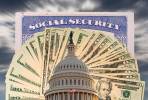Officials get earful on taxes
Disgruntled residents have bombarded Clark County officials with phone calls complaining about their tax bills rising while their property values sink in the economic downturn.
Those who crunch the numbers say there's an explanation, though one not likely to dispel all confusion or vitriol.
"Our phones are blowing off the hook with this stuff," said Assistant Treasurer Rebecca Coates, whose office mailed out tax bills this week.
Michele Shafe, assistant county assessor, said her office also has been inundated with calls. She estimates that close to 1,000 people a day have phoned this week to ask questions or vent.
"It's a very confusing system," Shafe said.
The county's property tax revenue this year dropped to $2.24 billion from $2.32 billion, putting $82 million less in its coffers.
Taxes will be lower on about 400,000 properties, more than half of county's 730,000 parcels, according to county estimates.
Still, that means 330,000 property owners will see tax bills as high or higher than last year, which has created a torrent of grumbling.
Paying a higher tax can be puzzling -- and galling -- for people who have watched their assessed values drop in the past year or two, Coates said.
Several years ago, with home prices skyrocketing, a 3 percent cap on property tax increases was imposed on owner-occupied homes and an 8 percent cap on commercial properties, based on 2004-05 assessed values. Even after that, home prices continued to rise for a while. This now means that taxes, which have been kept artificially low, can continue to increase until property values fall below pre-2005 levels.
So, a homeowner whose house was worth $350,000 last year and just $250,000 this year would see his taxes increase to $1,920, $56 more than last year, according to the Clark County assessor's office. But without the cap, this year's taxes would be $2,844 under the normal tax rate.
By law, a property owner pays whichever is less: a 3 percent increase from last year's tax bill or the regular 3.276 percent property tax rate levied on the most recent assessed value, Coates said.
Marlene Drozd, a southeast valley homeowner, described getting sticker shock when she saw her tax bill go up by $100, even though her property depreciated.
"I didn't expect it to be what it was," Drozd said. "It's a total outrage."
Drozd said the Treasurer's office explained to her why her taxes jumped, and she didn't buy it. She said she doesn't know what her home was assessed at before the tax cap went into effect, but doesn't think any of that should matter.
Homeowners struggling to survive should not have to shoulder so much of the tax burden while big casinos get tax breaks, she said. "That is unacceptable."
Shafe said many residents have also called the assessor's office demanding to know why their 3 percent cap disappeared. In these cases, the property values dropped below 2005 levels, eliminating the need for a cap, she said.
Savings from the cap show up as zero on the tax bill, leading some folks to believe they've been cheated, she said. In truth, they've crossed that threshold when their tax bills begin to shrink.
"It's actually good for them because they're paying less, but they don't see it that way," Shafe said. "Some people don't understand it."
Contact reporter Scott Wyland at swyland@reviewjournal.com or 702-455-4519.
AT A GLANCE
WHOSE PROPERTY TAXES WILL BE LOWER?
RESIDENTS WHOSE PROPERTY VALUES FALL BELOW WHAT THEY WERE IN 2004-05, THE YEAR THAT A 3 PERCENT TAX CAP WAS IMPOSED. ABOUT 400,000 PROPERTY OWNERS FALL INTO THIS CATEGORY.
WHOSE PROPERTY TAXES WILL BE AS HIGH OR HIGHER?
RESIDENTS WHOSE PROPERTY VALUES REMAIN ABOVE WHAT THEY WERE IN 2004-05. ABOUT 330,000 PROPERTY OWNERS FALL INTO THIS CATEGORY.























